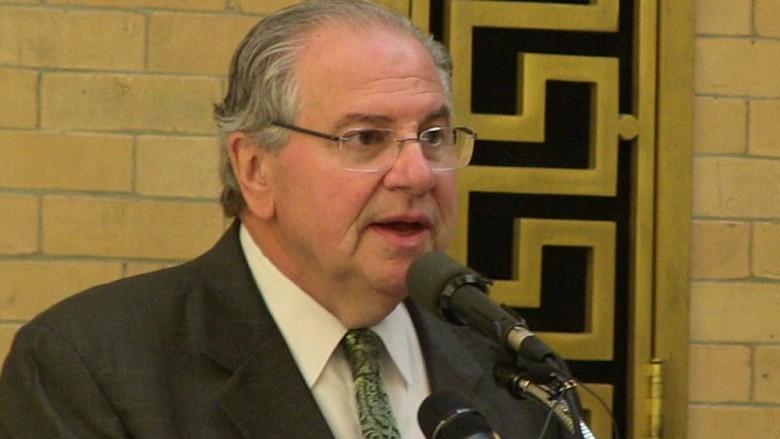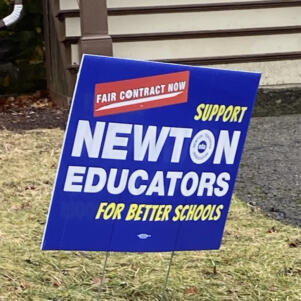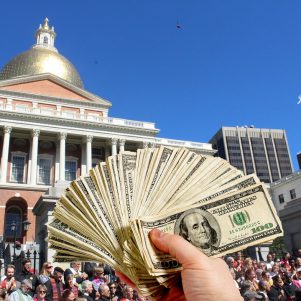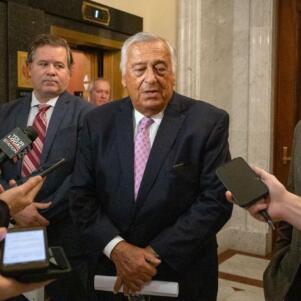Speaker DeLeo backs charter school options for districts
By State House News Service | January 27, 2016, 17:31 EST
 House Speaker Robert DeLeo. (State House News Service)
House Speaker Robert DeLeo. (State House News Service) BOSTON – Massachusetts school districts should be allowed to pursue charter schools if they want, Speaker Robert DeLeo told his colleagues in the House of Representatives Wednesday, stirring up an issue in his annual address to the House that has been mired in the Senate where charters are viewed with skepticism.
“Districts that want charters should be given the chance to pursue them, or any other option that they may deem necessary, in order to do right by their students,” the Winthrop Democrat said. “We may not always agree on how we get there, but we must respond collectively to students who call out for opportunity.”
DeLeo also said he anticipated Uber and Lyft legislation to emerge in the House in February, reiterated his opposition to new taxes and fees in the upcoming budget and pushed for “sustainable” reforms to the state’s early education framework.
After a bill that would have expanded available charter school seats in underperforming districts ran aground in the Senate last session, DeLeo, who was elected speaker for the fourth time a year ago, has largely left the issue to the Senate to advance. Aides suggested he remains committed to that position.
“The House was proud to pass a thoughtful, balanced and consensus-driven achievement-gap bill,” DeLeo said in his speech. “But we must not stand by idly, waiting for our goals to take shape because there are maybe some bumps in the road.”
Asked what might be done about charter schools before the speech, DeLeo said, “Right now how further we’re going to go, I’m not sure. A lot will tell in coming months.”
House Minority Leader Brad Jones interpreted DeLeo’s position as “we won’t necessarily wait forever,” and praised the speech overall as focusing on “an important but relatively narrow agenda.”
The charter question has traction outside the chambers of the Legislature, as charter supporters are gearing up for a November ballot fight on a proposal that could allow for an additional 12 new charter schools or charter expansions every year. Another group has sued the state, seeking expanded access to charter schools.
In his first session presiding over a body that rejected the 2014 charter school bill on a 13-to-26 vote, Senate President Stanley Rosenberg has assembled senators to wrestle with comprehensive reform of charter school law.
The speaker and the Senate president have broadly aligned goals to focus on education, including early education – something Boston Mayor Marty Walsh called for in his State of the City speech.
“Although we recognize that we’re facing some real financial constraints, the House will keep its focus on our most precious resource: our children. We have one shot to get this right, and we will,” DeLeo said in his annual address to the members.
The speaker’s yearly speech to the House, a less formal affair than the annual address by the governor, dates back to Speaker Thomas Finneran.
DeLeo said the House next month would take up legislation to deal with new technology changing the way people get around – transportation network companies, such as Uber and Lyft.
Distinct from taxis, supported by smartphone applications and existing in a largely unregulated capacity since they were introduced to Massachusetts, the ride-hailing companies would be given a more solid foundation, according to the speaker.
“We will find a way to make companies such as Uber and Lyft part of the permanent landscape in Massachusetts while keeping in mind the benefit that competition from taxicabs and livery companies bring to the marketplace,” DeLeo said. “Consumer choice is a good thing, and we will take up that legislation that accomplishes that goal in the month of February.”
Rep. Aaron Michlewitz, the House chairman of the Financial Services Committee, has taken the lead on that issue.
“There will be some regulation framework that would be part of the bill but it’s too early to get into the particulars of how that would break down,” Michlewitz told the News Service after the speech.
The heavily regulated taxi industry has sought to bring the unregulated ride-hailing services under a similar regime of checks and requirements.
“Trying to find something that is going to accommodate both them and please both of them is going to be a Herculean task,” Jones told the News Service.
Saying the legislation will aim for a “balanced approach” between the competing interests, Michlewitz said people working on the bill have met with drivers, as well as the local ride-hailing company Fasten. Asked who would be most pleased with the bill, the Boston Democrat said, “Hopefully the consumers of the Commonwealth will be the ones that will get the biggest win out of whatever we do – that’s our focus.”
DeLeo reiterated his aim to keep new taxes and fees out of the fiscal 2017 budget, a goal shared by Gov. Charlie Baker, and the speaker linked that objective to “fostering a stable, responsible political climate.” His now new taxes or fees line drew applause from members of the House, which is overwhelmingly controlled by Democrats.
Because of the constitutional organization of the branches of government the House speaker’s stance would likely foreclose any possibility for the more liberal Senate to advance tax or fee hikes.
“Certainly very happy about the no-new-taxes, no-new-fees,” Jones said.
Gov. Charlie Baker on Wednesday proposed a $39.55 billion fiscal 2017 budget that increases spending by 3.5 percent but calls for many government accounts to be level funded to support spending in fixed cost centers or at the Department of Children and Families.
With the House and Senate so-far deadlocked on dueling proposals to spur additional growth in the solar energy market and a bigger energy bill anticipated later in the year, the speaker only broadly outlined his position on the subject, seeking to ensure that “we keep the lights on at a reasonable cost to ratepayers” and saying energy is an issue that “cries out for solution.”
“This year, the House will pass legislation that will promote resource diversity and cleaner energy, contain costs and ensure that we maintain a reliable electric grid,” DeLeo said. “While the concepts are complex, at its core this bill will be about supporting our constituents as the Commonwealth continues to grow and compete in a dynamic economy.”
Rep. Tom Golden, a Lowell Democrat who is House chairman of the Committee on Telecommunications, Utilities and Energy, said a larger energy bill dealing with procurement of hydroelectricity and off-shore wind would likely take at least the month of February to draft and might not include solar.
“Solar we already have a conference committee on, so we’re probably going to stay on that track and work with the conference committee,” Golden said. “That would be my intention.”
Written by Andy Metzger, with reporting by Michael P. Norton











